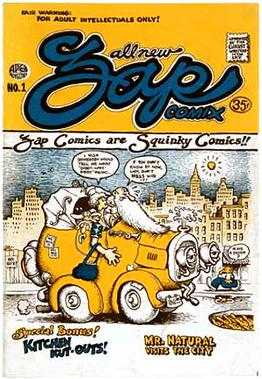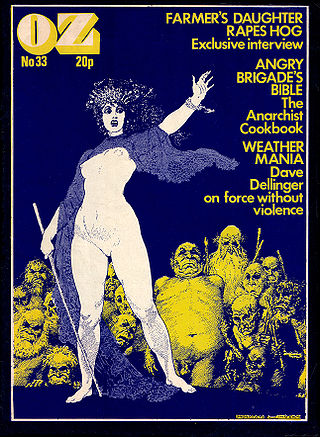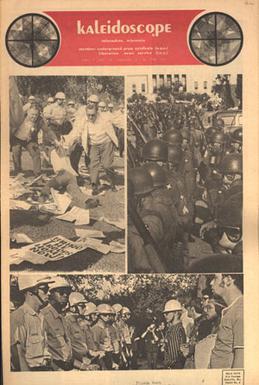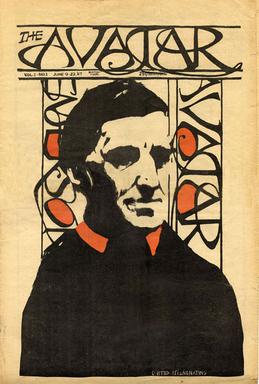
Underground comix are small press or self-published comic books that are often socially relevant or satirical in nature. They differ from mainstream comics in depicting content forbidden to mainstream publications by the Comics Code Authority, including explicit drug use, sexuality, and violence. They were most popular in the United States in the late 1960s and 1970s, and in the United Kingdom in the 1970s.

"Omaha" the Cat Dancer is an erotic comic strip and later comic book created by artist Reed Waller and writer Kate Worley. Set in fictional Mipple City, Minnesota in a universe populated by anthropomorphic animal characters, the strip is a soap opera focusing on Omaha, a feline exotic dancer, and her lover, Chuck, the son of a business tycoon.

The terms underground press or clandestine press refer to periodicals and publications that are produced without official approval, illegally or against the wishes of a dominant group. In specific recent Asian, American and Western European context, the term "underground press" has most frequently been employed to refer to the independently published and distributed underground papers associated with the counterculture of the late 1960s and early 1970s in India and Bangladesh in Asia, in the United States and Canada in North America, and the United Kingdom and other western nations. It can also refer to the newspapers produced independently in repressive regimes. In German occupied Europe, for example, a thriving underground press operated, usually in association with the Resistance. Other notable examples include the samizdat and bibuła, which operated in the Soviet Union and Poland respectively, during the Cold War.

Kitchen Sink Press was a comic book publishing company founded by Denis Kitchen in 1970. Kitchen Sink Press was a pioneering publisher of underground comics, and was also responsible for numerous republications of classic comic strips in hardcover and softcover volumes. One of their best-known products was the first full reprint of Will Eisner's The Spirit—first in magazine format, then in standard comic book format. The company closed in 1999.

The Omaha World-Herald is a daily newspaper in the midwestern United States, the primary newspaper of the Omaha-Council Bluffs metropolitan area.
This is a list of media serving the Omaha metropolitan area in Omaha, Nebraska and Council Bluffs, Iowa.
A kaleidoscope is a tube of mirrors containing small colored objects.

Kaleidoscope was an underground newspaper that was published in Milwaukee, Wisconsin, USA. Founded by John Kois, the radio disk jockey Bob Reitman and John Sahli, it was published from October 6, 1967, to November 11, 1971, printing 105 biweekly issues. The paper's first issue was printed with a borrowed $250 in an edition of 3,500 copies, which sold out in two days.
Kois v. Wisconsin, 408 U.S. 229 (1972), was a ruling by the U.S. Supreme Court in the case of the obscenity conviction of Milwaukee editor-publisher John Kois, whose underground newspaper Kaleidoscope had published two small photographs of pictures of nudes and a sexually-oriented poem entitled "Sex Poem" in 1968. The Supreme Court ruled that, in the context in which they appeared, the photographs were rationally related to a news article which they illustrated and were thus entitled to Fourteenth Amendment protection, and that the poem "bears some of the earmarks of an attempt at serious art", and thus was not obscene under the Roth v. United States test. In the words of the concurring opinion of Justice William O. Douglas, "In this case, the vague umbrella of obscenity laws was used in an attempt to run a radical newspaper out of business and to impose a two-year sentence and a $2,000 fine upon its publisher. If obscenity laws continue in this uneven and uncertain enforcement, then the vehicle has been found for the suppression of any unpopular tract. The guarantee of free expression will thus be diluted and in its stead public discourse will only embrace that which has the approval of five members of this Court."

The Omaha Daily Bee, in Nebraska, United States, was a leading Republican newspaper that was active in the late 19th and early 20th century. The paper's editorial slant frequently pitted it against the Omaha Herald, the Omaha Republican and other local papers. After a 1927 merger, it was published as the Bee-News until folding in 1937.

The Chicago Seed was an underground newspaper published biweekly in Chicago, Illinois from May 1967 to 1974; there were 121 issues published in all. It was notable for its colorful psychedelic graphics and its eclectic, non-doctrinaire radical politics. Important events covered by Seed writers and artists were the trial of the Chicago Eight, Woodstock, and the murder of Fred Hampton. At its peak, the Seed circulated between 30,000 and 40,000 copies, with national distribution.
The Bugle or Bugle-American was an underground newspaper based in Milwaukee, Wisconsin. Distributed throughout the state from September 1970 to 1978, it was published weekly for most of that time for a total of 316 issues. The Bugle, an early example of the alternative newsweekly genre, was less radical than the city's other underground newspaper, Kaleidoscope, although it was not viewed that way by the local media such as the Milwaukee Journal and Milwaukee Sentinel.

Gerald Thomas Bergan was an American clergyman of the Roman Catholic Church. He served as bishop of the Diocese of Des Moines in Iowa (1934–1948) and archbishop of the Archdiocese of Omaha in Nebraska (1948–1969).

Avatar was an American underground newspaper published in Boston, Massachusetts, in 1967–1968. The newspaper's first issues were published from the headquarters of Broadside magazine in Cambridge.

Hundred Flowers was an American underground newspaper published in Minneapolis, Minnesota from April 17, 1970 to April 4, 1972. It was produced by a communal collective, with the main instigator being antiwar activist and former Smith College drama instructor Ed Felien. The 16-page, two-color tabloid was published weekly and cost 25 cents, circulating about 5,000 copies.

Old Mole was a radical New Left oriented underground newspaper published in Cambridge, Massachusetts from September 1968 to September 1970. Old Mole was continued by a second volume titled The Mole, which published five issues from November 1970 to April 1971. Printed biweekly in a 16-page tabloid format, Old Mole was based for most of its existence in a storefront and basement office on Brookline Street in Central Square. Selling for 15 cents, 47 issues were published in all, with press runs averaging 8000 to 10,000 copies. Subscriptions were free to prisoners and soldiers.

The Houston Forward Times (FT) is a weekly newspaper headquartered in Houston, Texas. It is one of the largest black-owned newspapers in the city. It is published by the Forward Times Publishing Company, which also publishes other publications such as the Daily Cougar. As of 2014, the FT is one of the few remaining self-printing black newspapers.

TheOmaha Star is a newspaper founded in 1938 in North Omaha, Nebraska, by Mildred Brown and her husband S. Edward Gilbert. Housed in the historic Omaha Star building in the Near North Side neighborhood, today the Omaha Star is the only remaining African-American newspaper in Omaha. It may be the only newspaper in the United States started by an African-American woman.













